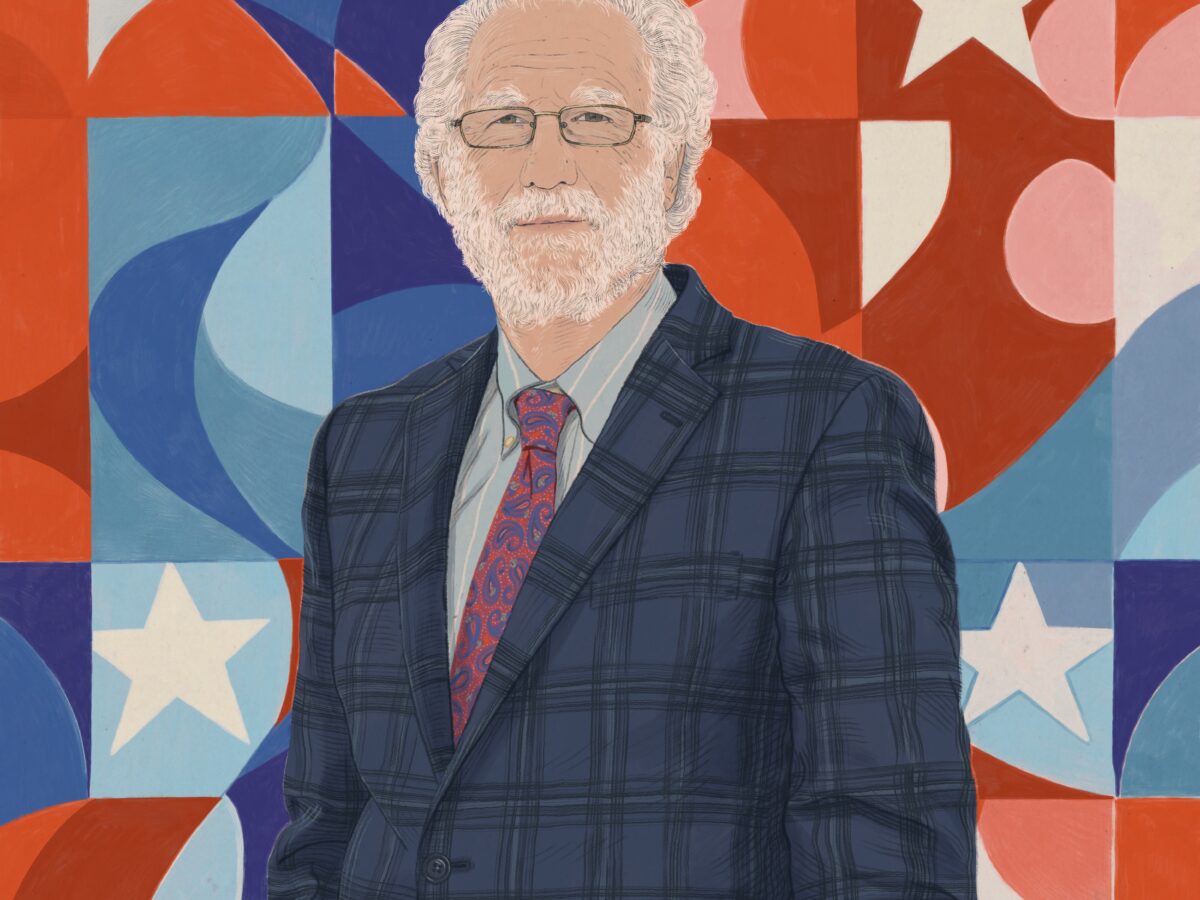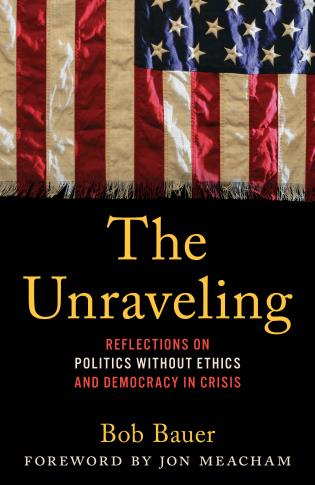The ethics of American politics

A conversation with attorney and professor Bob Bauer ’70
Bob Bauer ’70 is no stranger to political partisanship and controversy. During his 46-year career as an attorney, he has served in various legal roles for Democratic Party organizations and candidates: advising House and Senate Democratic leaders during President Bill Clinton’s impeachment; acting as Barack Obama’s campaign lawyer and White House counsel; and as senior adviser to the Joe Biden presidential campaign on voting rights and election protection. He is a scholar-in-residence at New York University School of Law.
In his latest book, The Unraveling: Reflections on Politics Without Ethics and Democracy in Crisis, Bauer assesses today’s American politics through the lens of his own conflicts and compromises as a political lawyer. He candidly shares moments when he stumbled, contributing to intensifying partisanship, and others when he succeeded in bipartisan conversation, such as with the 2022 Electoral Count Reform Act and recommendation for changes to the Insurrection Act. The Unraveling offers a timely reflection on ways to restore respect and decency to the political arena and strengthen democracy.

What motivated you to write this book?
I wanted to write about politics as I saw it, addressing as fairly and vitally as I could the state of contemporary American politics. I thought that one way to do that — and also potentially to speak across the aisle at a time that it’s hard to do so — was to review the issues from the perspective of my career and acknowledge my role in the accelerating pull of polarization — the drive to win and the costs of what I term the ‘warrior’ mentality. I wanted to write about ethics as part of participation in the political process. I teach a course at NYU Law about the role of the lawyer in public life. It’s about lawyering and ethics in positions of public responsibility, mostly in government, but some in private life and political campaigns. That’s what shaped my approach to the book.
You describe your work on the Electoral Count Reform Act as one of the most rewarding experiences of your career. Why?
I continue to be very active in Democratic Party politics, but I have tried to create and preserve a space for bipartisan reform work. In the last cycle, working on the Electoral Count Reform Act, an issue that was fraught with partisan tensions, what I found is that there is a way to mark out common ground. I continue to believe that every now and then you can get Democrats and Republicans together, and a conversation that is properly structured can take place, because there is a set of common commitments to the democratic process that you can ultimately appeal to.
You write about your father, an immigrant to this country. How does he inspire you?
He came to the United States embracing the country as a Roosevelt Democrat, but nonetheless, he wanted to hear what other people had to say. He had tremendous faith in dialogue, and in democratic institutions — and he recognized when they could be dangerously under siege. I write in the book that he was a lifelong, fierce antagonist of Richard Nixon. But at the same time, if he had an opportunity to talk to Republicans, hear what they had to say, understand their arguments, he thought that was all a part of what made politics exciting and rewarding, and so extraordinarily valuable. He inculcated that in me, and I wrote about that because both his life experience and also the way he talked about politics brought that home to me very, very forcefully.
You take readers behind the scenes of some of recent history’s most consequential political battles in some wonderful anecdotes. Do you have a favorite?
With some of the stories about Presidents Obama and Biden, I wanted to give some flavor of how organizational integrity ultimately depends on not just rules or even ethical norms. It depends on, if you will, vibes: the culture that leaders establish, and how they handle these issues. There’s only so much you can do to make ethical prescriptions have the bite that you would like them to have. They have some guidance value, but beyond that, what you really want are people in positions of responsibility who are communicating their commitment to ethical politics by their actions, by how they speak, by their fidelity to truthfulness in the communications and interactions with other people. They set the tone, and that tone is what’s so powerful. If you have people at the top who want you to think hard about these issues and make the right calls, that is going to spread throughout the entire organization. It’s going to affect the younger lawyers; it’s tremendous training for younger lawyers.
You’ve served clients in the highest offices in America. How did your time at Exeter serve you in those roles?
I benefited enormously from having Jack Herney as a history instructor. Another significant influence was English Instructor Charles Terry, whom I just thought the world of. When we talked about responses that we had to works of literature, we wound up talking about fundamental moral issues — how we might think about the moral implications of choices that the authors made, or the choices the authors depicted that the characters made. It was a deeply unique, ethically rich mode of instruction. There’s no question that those early experiences, more subsequently than the ones I had in college and law school, had a really significant effect on how I think about issues of common concern.
What’s the most important lesson you’d like your book to impart?
A couple of years ago, I spoke to the assembly at Exeter about my years of politics, and one of the things that I talked about was the importance of, under these kinds of pressures — and they are enormous pressures and strains on the society, strains on the democracy — the importance of still embracing a degree of humility and an openness to conversation. We have to adopt an ethic that puts us at the table with people we strongly disagree with, and learn both how to listen and also how to persuade. A very good friend of mine, also class of ’70, who lived down the hall from me at Exeter, Bob Gerrard, once said: “Don’t argue. Persuade.” And I mentioned that to the assembly: “Don’t argue. Persuade. Listen — and then try to be persuasive.” When I do my nonprofit work around the country on elections and I sit in the room with Republicans and election officials, those conversations are conversations in which it is really important for me to hear what they have to say, with the understanding that they will also listen to what I have to say. What is needed is a conversation and not a confrontation.
This article was originally published in the Fall 2024 issue of The Exeter Bulletin.